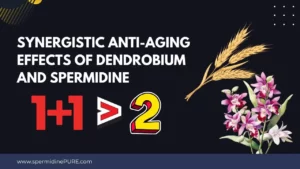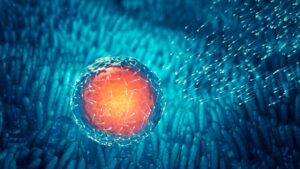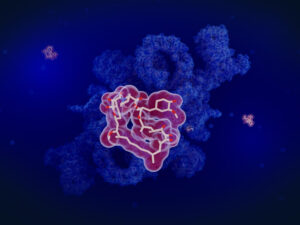Overview of NMN
NMN (nicotinamide mononucleotide) is a nucleotide, found naturally in the body, involved in the production of NAD+ (nicotinamide adenine dinucleotide) in the body. NAD+ is a coenzyme that plays a key role in energy metabolism and DNA repair.
There is some evidence to suggest that NMN may have potential health benefits, including anti-aging effects, improved insulin sensitivity, and improved cardiovascular health. NMN has been shown to increase NAD+ in animals, which may lead to the activation of enzymes that are involved in DNA repair and the regulation of energy metabolism. This may have potential anti-aging effects and may also improve insulin sensitivity and cardiovascular health.
Overview of Spermidine
Spermidine is a polyamine that can be found in high amounts in the brain and other tissues throughout the body. It’s involved in DNA synthesis and cell division, among other things. Spermidine naturally occurs within humans’ bodies
There is some evidence to suggest that spermidine may have potential health benefits, including anti-aging effects, neuroprotective effects, improved cardiovascular health, and immune function.
Spermidine is gaining attention for its potential to combat oxidative stress and inflammation, as scientific evidence points to it having anti-inflammatory and antioxidant effects. It may even help protect brain cells from damage, promote cardiovascular health and enhance immune system functioning.
Comparison of NMN and spermidine
Similarities
NMN (nicotinamide mononucleotide) and spermidine are both compounds that have been studied for their potential health benefits.
Both NMN and spermidine have been studied for their potential to reverse the effects of aging. NAD+ levels in the body can be boosted by supplementing with NMN, which may potentially help repair damaged DNA as well as energize cell metabolism. On top of this, research suggests that consuming or supplementing with spermidine could provide antioxidant protection from free radicals while reducing inflammation – two key factors linked to signs of accelerated aging!
Another similarity between NMN and spermidine is that they have both been studied for their potential effects on cardiovascular health. NMN has been shown to improve blood flow and reduce markers of oxidative stress in animal studies, which may have potential cardiovascular benefits. Spermidine has also been shown to have beneficial effects on blood pressure and arterial function in animal studies, which may have potential cardiovascular benefits.
Differences
NMN and spermidine are similar in that they have both been studied for their potential health benefits, but they have different functions and mechanisms of action in the body.
Autophagy is the key mechanism by which spermidine aids in delaying aging and extending life span. Spermidine also works through different pathways, including anti-inflammation, histone acetylation reduction, lipid metabolism and control of cell growth and signaling pathways.
Spermidine may be a key to unlocking the secrets of eternal youth. Through its ability to stimulate autophagy, it appears that spermidine can potentially help maintain cellular balance in the body and protect against age-related deterioration. Studies show that this process is triggered by AMPK – an energy metabolism regulator – suggesting a tantalizing possibility for healthier aging through increased longevity.
Recent research has uncovered potential anti-aging benefits of spermidine, suggesting that it may be able to stimulate autophagy and thus support healthy aging. However, more studies are required before the full extent of these effects can be understood – a conversation with your healthcare provider is strongly recommended if you consider taking this supplement as part of your health regime.
The verdict
Spermidine and NMN are hot ingredients in the quest for anti-aging, but they take a different approach. Spermidine powder helps by activating autophagy – our body’s own process to renew itself through breaking down damaged cells, while NMN boosts NAD+ levels naturally found within us. With their molecular formulas C7H19N3 and C11H15N2O8P respectively plus solubility & stability in water, spermidine could be said to be the leading candidate when it comes to protecting against aging!



